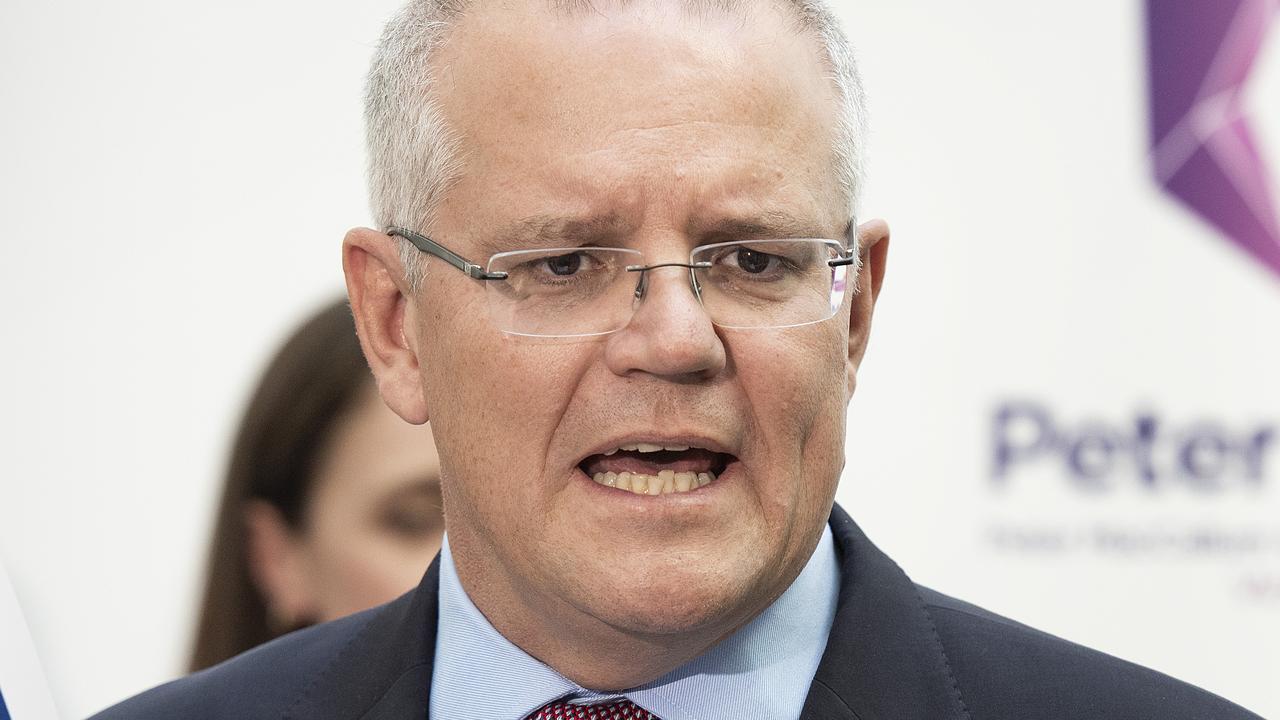Newspoll: Turnbull’s popularity plunges in wake of Super Saturday
Malcolm Turnbull’s popularity has plunged as he prepares for a high-stakes showdown with rebel MPs over the NEG.
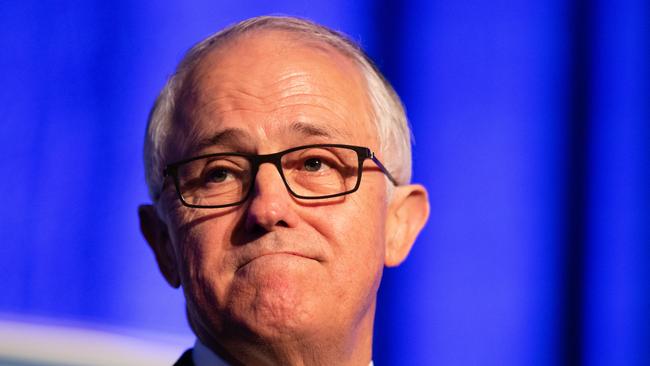
Malcolm Turnbull’s popularity has plunged, and the Coalition’s primary vote has softened, as the Prime Minister and Energy Minister Josh Frydenberg prepare for a high-stakes showdown with rebel MPs tomorrow over the national energy guarantee.
The Australian has confirmed Mr Turnbull has asked Mr Frydenberg and Scott Morrison to “fast-track” a detailed plan for the energy subcommittee of cabinet within weeks that would give the green light for the government to underwrite new-generation power sources, including the potential for coal.
It is also understood that Australian Competition & Consumer Commission chairman Rod Sims will brief the Nationals partyroom today on his recent report into energy pricing that recommends the use of government debt financing for new sources of power generation.
Amid moves to head off a growing rebellion on the Coalition backbench over the NEG by holding out the offer of a potential lifeline for coal generation, Mr Turnbull emerges from the parliamentary winter recess to face the partyroom in a weakened position of authority.
With Tony Abbott holding out the threat of crossing the floor over the NEG and several MPs privately confirming they may follow him, an exclusive Newspoll conducted for The Australian shows Mr Turnbull’s personal ratings falling sharply since the Coalition’s failed campaigns in the Braddon and Longman by-elections a fortnight ago.
In the 38th consecutive Newspoll in which the Coalition has trailed Labor on a two-party-preferred vote, Mr Turnbull’s commanding lead over Labor leader Bill Shorten as the preferred prime minister has been slashed from 19 points to 12 points.
Satisfaction with Mr Turnbull’s performance has also nosedived, dropping six points in two weeks leading to a negative net satisfaction rating of minus 19 and almost rivalling the Labor leader’s unpopularity.
The scandals surrounding Labor MP Emma Husar and the Opposition Leader’s handling of the affair has had little impact on Mr Shorten’s performance rating.
While the two-party-preferred vote has remained unchanged, with Labor still leading the Coalition 51-49, the Coalition suffered a two-point decline in popular support, with the primary vote dropping back to 37 per cent and One Nation’s support rising two points to 9 per cent.
The decline has coincided with growing rural anger fuelled by media criticism over the government’s response to the drought.
The Coalition’s failure to register a primary vote of more than 30 per cent in the Longman by-election has sparked fears among the Liberal National Party’s 21 MPs that the next federal election could be lost in Queensland.
Labor was not spared in the Newspoll, with its primary vote also falling a point to 35 per cent, reflecting continuing dissatisfaction with both major parties.
With energy set to dominate the political debate as parliament returns today, the Newspoll also shows the Coalition’s lead has evaporated on who is best at maintaining energy supply and keeping power prices lower.
The Coalition held a six-point lead on this question last month but now holds only a one-point advantage over Labor.
On Friday, the government secured agreement from the states and territories at a Council of Australian Governments meeting for the NEG to be progressed to a draft exposure bill.
Victorian Labor Premier Daniel Andrews has argued that there is little point signing up to the policy if it has not received support from the Coalition partyroom.
Mr Frydenberg yesterday maintained the policy had “strong support” in the partyroom.
“I am confident that come Tuesday, my colleagues will again move forward to the next stage of the national energy guarantee,” he said.
“I welcome (former) prime minister John Howard’s comments the other day supporting the national energy guarantee.
“My colleagues have been briefed by the miners, the manufacturers, the farmers, the industry groups who say this is the only game in town to reduce people’s power bills.
“My colleagues are focused on one thing, which is to reduce people’s power bills, and rightly so, and we have turned the corner.”
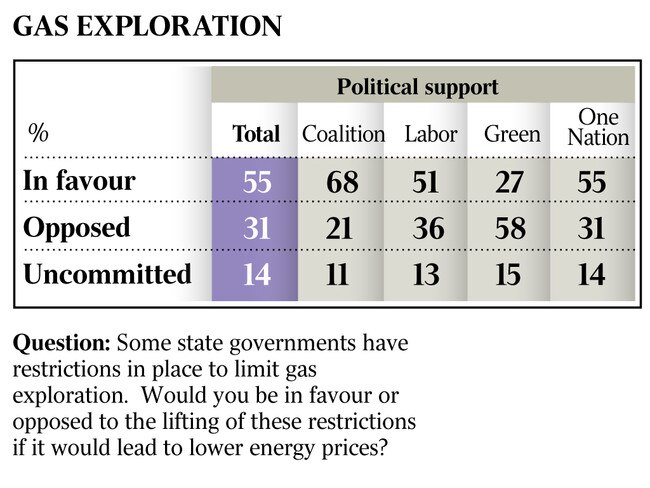
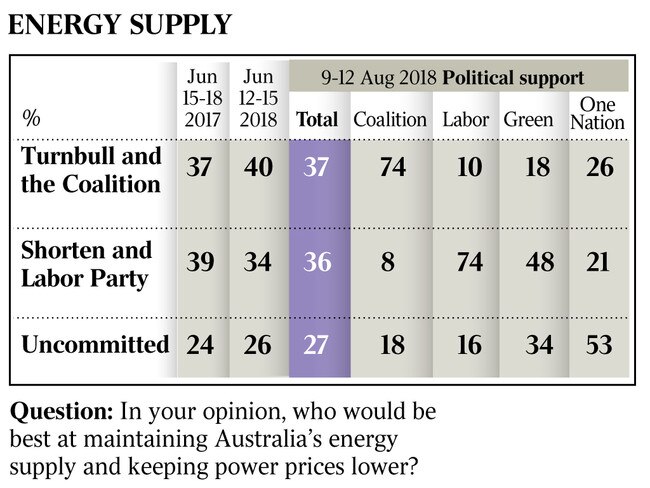
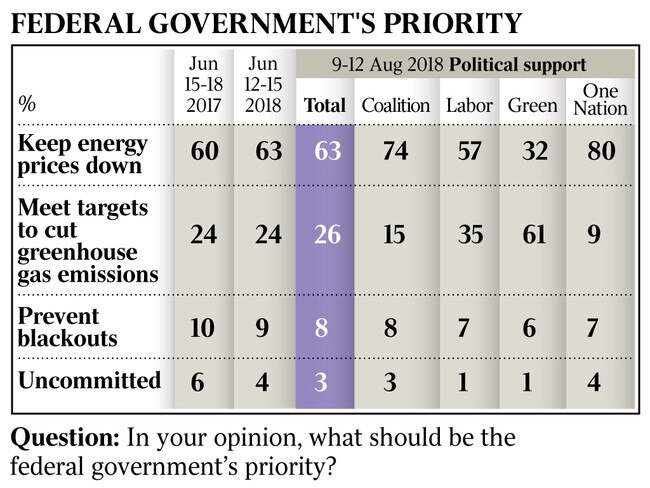
It is understood Nationals leader and Deputy Prime Minister Michael McCormack has backed the plan for underwriting new-generation power as contained in the ACCC’s recommendation.
Treasury, the Department of Environment and Energy, the Energy Security Board, the Clean Energy Finance Corporation and the Infrastructure and Projects Financing Agency will advise on issues yet to be resolved, such as identifying potential investors and what the underwritten wholesale price should be set at.
The rationale is that such a mechanism would give confidence for investors and large industrial and commercial users to build low-cost generation that could potentially include coal or gas.
The “big three” — AGL, Origin and Energy Australia — would be excluded.
One senior Liberal Party source said while the policy might survive the Coalition partyroom, it might not survive parliament even with the “add on” component of a government guarantee on new-generation investment.
The senior Liberal MP said it would be wrong to assume those threatening to cross the floor were limited to Mr Abbott, Barnaby Joyce and a couple of disgruntled LNP marginal-seat MPs.
It is also uncertain whether the government could rely on crossbench support in the lower house to pass the NEG, which has set an emissions reduction target of 26 per cent of 2005 levels.
Federal Labor is calling for a 45 per cent target.
Mr Frydenberg continued his attacks on the Victorian government, which with Queensland has threatened to torpedo the NEG, which requires mirror state legislation, claiming there was a genuine threat of blackouts in Victoria if the NEG was not passed.
“Last September, the Australian Energy Market Operator said there was a 43 per cent chance of load shedding in Victoria. That’s a euphemism for blackouts,” he said.
“Victoria not only has the second-highest prices in Australia but it also, following the closure of Hazelwood, which took 25 per cent of the supply out of the market, has gone from being an exporter of power at times to now being an importer of power.”
An exclusive Newspoll conducted for The Australian reveals the Coalition’s primary vote slipping from 39 to 37 per cent, with One Nation increasing from 7 to 9 per cent.
With MPs returning to Canberra following the winter break, Newspoll shows Mr Turnbull’s lead over Bill Shorten as preferred Prime Minister has been slashed from 19 points to 12 points.
In the 38th consecutive Newspoll in which the Coalition has trailed Labor on a two-party preferred vote, the government remains behind at 49/51.
Labor also experienced a decrease in its primary vote, falling back one point to 35 per cent.
The Newspoll, which was conducted between August 9 and August 12 based on 1607 interviews among voters, showed satisfaction with Mr Turnbull’s performance has nosedived, dropping six points in two weeks leading to a negative net satisfaction rating of minus 19, almost rivalling Mr Shorten’s unpopularity.
The latest Newspoll comes a fortnight after the Super Saturday by-elections where the Liberal National Party secured only 29.6 per cent of the primary vote in Longman, shedding votes to Pauline Hanson’s One Nation.




